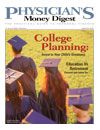Education Vs Retirement: Preserve Your Future, Too
Through the yearsyou have probably devoted plenty ofthought to your retirement. And as a physician-parent, youhave probably dreamt of the day your child graduates from aprestigious university—perhaps continuing on to medicalschool. As you plan for these goals, have you ever stopped tothink that pursuing both at the same time could be a financialdecision of disastrous proportions? Could you bring yourselfto choose between your future and your child's future?
Various Options
CNN/Money
For starters, there aren't many financial-aid options forretirement, whereas there are many to help fund your child'scollege education. According to , basically theonly assistance available to you for your retirement finances isSocial Security. Other than that, most people support their retirementprimarily by personal savings and tax-advantagedretirement savings vehicles. On the other hand, paying the collegeprice tag can be accomplished in a variety of ways. Unfortunately,there aren't any retirement scholarships available.
Although parents may be tempted to put their child'sfuture before their own, physician-parents should rememberthat having your child pay their own way through collegehas its advantages. For many aspiring students, paying forcollege will be their first foray into the world of seriousfinancial responsibility. This would teach them a lesson morevaluable than anything they'll learn in Economics 101. Plus,they may appreciate their education more fully if they comprehendthe dollar value of attending classes. When a studentrealizes that each time they cut class they are wasting agood sum of their own money, attendance will be a priority.Furthermore, if your child is responsible for paying weightystudent loans, they may be more eager to take classes andparticipate in internships that will lead to a promising career.
Even if you feel that you should help your child with someof the loan payments, they will still benefit from navigatingthe loan process and organizing their part of the payments.Best of all, you will still be able to sock more away in yourretirement fund. Most student loans have a 15-year paybackperiod, so payments are generally low. For example: If yourchild's total education costs are around $80,000, they canexpect to make payments of roughly $400 a month.
If you insist on funding your child's education, you'll haveto be very careful and have a well-thought-out plan inadvance. Basically it boils down to this: The less you pay foryour child's college costs, the earlier you'll be able to retire.
Controllable Costs
Tuition costs aren't going to see adramatic decrease any time soon, butcosts for most colleges and universitiescan still be relatively manageable.According to the College Board,around 50% of 4-year college studentspay less than $6000 per year fortuition and fees. So if you're fortunateenough to have a child who wants toattend a public school (average yearlycost of $5132) and commute fromhome to avoid expensive room andboard fees, then you won't have to hitthe panic button on your wallet.
Then again, Junior may want to followin your physician footsteps, andyou don't need to be told how expensivethat can be. In this case, you'llneed a very solid financial plan inplace, especially if you want to helpalleviate some of the burden on yourchild to pay back astronomical medicalschool costs, which have probablykept you up at night.
As with most financial endeavors, ifpaying for your child's education issomething that you are dedicated to,the key is to save early and save a lot.Your best bet for a savings vehicle is a529 college savings plan. A 529 planallows your contributions to grow taxfree,which is a much better optionthan dipping into your Roth IRA tofund college. Your retirement vehiclesshouldn't be touched until you areready to use them for retirement. Talkwith your financial advisor about yourideal savings strategy.
For example:
When the time comes to face educationalcosts, sit down with your teenand go over the expenses for which theywill be responsible. If your child is tryingto decide between multiple schools,point out cost as a big factor. If University A will cost them$80,000 in total college expenses andUniversity B will cost them $60,000their choice may be a little clearer.
Also, be sure to have your childapply for as many scholarships as possible,which could finance a good portionof their college costs, or maybeeven give them a free ride. What betterway to fund an education than nothaving to pay for it at all?
Future Planning
Don't think that by putting moremoney into your 401(k) than yourchild's 529 that you're neglecting yourchild's future. You can save tens ofthousands of dollars and fully pay forthe most expensive schools for yourchildren, but if you retire before your100th birthday, you'll be in quite afix—unless you plan on your childrentaking care of you in your golden years.
According to a survey by GenworthFinancial, the current average annualcost of a private room in a nursing homeis $69,400, which is a 6% increase over2004. Imagine what the cost will be ifyou ever need that kind of care. Whateveryour needs are in retirement, youwouldn't want your children to shoulderyour bills, especially if they'll havechildren of their own. If you're currentlypart of the Sandwich Generation, takingcare of both your children and anelderly parent, you're all too familiarwith this dilemma. No one wants toplace that type of burden on their child,which brings into perspective just howimportant your retirement savings areand that they should take precedenceover paying for your child's college education.
